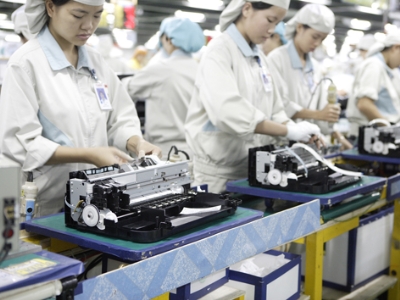|
The majority of the exports in the first
nine months of the year came from foreign invested enterprises (FIEs).
Experts have warned that domestic enterprises would “die” or be swallowed by
foreign sharks.
A report of the Ministry of Industry and Trade showed
that
The high export achievements did not make government
officials happy. Of this amount, FIEs brought the turnover of $58.69 billion,
or 61 percent of the total export turnover, not including the crude oil
exports. This means that the foreign invested economic sector, not domestic
enterprises, was the major momentum of the economic growth.
FIEs exported $15.4 billion worth of phones and phone
accessories out of the total $15.521 billion. They exported $7.568 billion
worth of computers, electronics and electronic parts out of the total $7.568
billion. The figures were $4.6/$6 billion in footwear, $7.8/$13 billion in
garments and $1.6/$2.6 billion in wooden furniture products.
FIEs were also the big exporters of farm produce, in
which domestic enterprises have great advantages. They exported $0.67 billion
worth of coffee products out of the total $2.2 billion and $0.4/4.6 billion
worth of seafood products.
An official of the Ministry of Industry and Trade has
admitted that
Vu Tien Loc, Chair of the Vietnam Chamber of Commerce
and Industry (VCCI), in an interview given to Dau tu newspaper, commented
that the Vietnamese export-oriented economy is now running with just one
engine – the foreign invested economic sector.
Dr. Nguyen Minh Phong, a well-known economist, also
said he can see problems in the FIEs’ dominance in export. It is obvious that
domestic enterprises have fewer advantages than FIEs.
Meanwhile, though making up a high export proportion,
FIEs have not created positive influences to the national economy. The FIEs
only assemble products in
Samsung, for example, exported $20 billion worth of
products, but it imported $19 billion worth of input materials. Meanwhile, it
enjoys big tax incentives which are not given to domestic enterprises.
Bui Kien Thanh, also a well-known economist, agrees
that domestic enterprises are at a disadvantage compared with FIEs.
Domestic enterprises have to borrow money from domestic
banks at the high interest rates of 10-20 percent, while FIEs pay 1-2 percent
only. FIEs can enjoy tax incentives and preferences in land using.
Thanh emphasized that the overly high interest rates
have burdened domestic enterprises. While FIEs’ export turnovers have been
increasing rapidly, domestic enterprises have been struggling just to
survive.
“The State needs to reconsider the monetary policies,
taxes, fees and other policies, or domestic enterprises would die or be
swallowed by foreign sharks,” Thanh said.
Phong warned that if the current situation cannot be
improved, domestic enterprises would get more ailing. Meanwhile,
Source: Tien Phong
|
Thứ Năm, 24 tháng 10, 2013
Đăng ký:
Đăng Nhận xét (Atom)

Không có nhận xét nào:
Đăng nhận xét